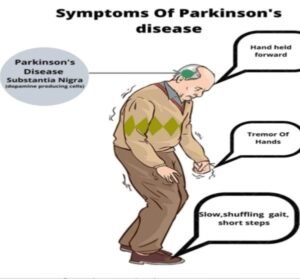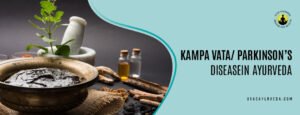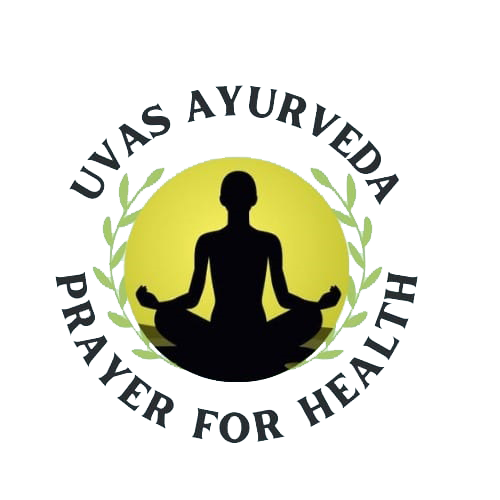In Ayurveda Parkinson’s disease is known by KampaVata. It is a vatavyadhi, and the diagnosis can be arrived based on vitiated vatadosha. Due to chalaguna of vata, tremors are seen in hands, even at rest. The word ‘kampa’ means shaking or shivering.

Parkinsons disease is a progressive brain disorder, where the cells of the brain progressively degenerate causing various symptoms, that affects movements. Symptoms progress gradually as it starts as unnoticeable tremors in the hands, reduced expressions on the face, reduced swaying of the hands on walking. These later become visible tremors, stiffness of the muscles of the body, rigidity of the muscles and movements, slouching forward while walking, slowness of the movements, slurred and soft speech.
Parkinson’s disease (PD) is a complex multi-system, neurodegenerative disease. Though predominantly perceived as a motor disease, it also has debilitating non- motor features, which are frequently missed and not treated. Major treatment goals are to increase striatal dopamine levels with precursor-substitution and/or reduce its breakdown.
Ayurvedic correlation
Parkinsons disease can be considered to Kampa-vata in ayurveda. Vata is the functional principle in the body responsible for movement. General Vata aggravation will cause emaciation or degeneration, blackishness, liking towards heat, tremor, flatulence and constipation.
As we age, apana vayu accumulates (sanchaya) and may become aggravated (prakopa). This leads to the constipation so commonly seen in the elderly. When this is combined with a vata increasing lifestyle and constitutional tendencies, the stage is set for vata to overflow (prasara) into circulation. Overflow causes vyana vayu to become disturbed within the rasa dhatu.
Systemic signs of vata disturbance occur, such as dryness of the membranes of the body. Vata may relocate (sthana samsraya) to any dhatus that are weak. When a preexisting weakness resides in the tissue of the brain, this becomes the site of relocation, and thus we have a condition of vata (prana, samana and vyana) in the majja dhatu, damaging portions of the brain stem and causing altered coordination and tremors.
Additional components of the pathology which are commonly present include vata (vyana) entering mamsa dhatu and causing muscle rigidity, or prana kshaya (diminished prana) entering the manovaha srota and causing depression.
Aggravation of Vata in the brain and related structures due to mental stress, improper diet and life style, lack of sleep leads to degenerative changes in the neurons. Progressive degeneration in the neuron, is the reason for this condition. Vata aggravates by default at the later part of life. So, we come across this condition, mostly, in old age.

Treatments
General Vata pacifying medicines and treatments and those specific to the disease are very effective in the management of Parkinson’s disease. Consumption of medicated ghee having the property of preserving brain cells, ayurvedic medicine which contains natural levodopa are the specific choice of medicines in the treatment protocol.
ROLE OF MUCUNA PRURIENS THE MOST PROMISING BOTANICAL FROM AYURVEDA: Ayurveda offers a natural source of levodopa – the seeds of Mucuna pruriens / kapikachu, which have a long standing safe use in the condition. Its clinical studies have shown pharmacokinetic profile distinct from synthetic levodopa, which is likely to reduce the untoward motor complications. Additionally, its seed extracts have shown neuro protective benefits which are unrelated to levodopa.
AYURVEDIC REGIMENS AND MEDICINAL PLANTS FOR NEUROPROTECTIVE AND SYMPTOMATIC BENEFITS: Other regimens (Panchakarma) and medicinal plants used in Ayurveda have been subjected to exploratory studies with promising early results in the condition. The debilitating non motor symptoms in patients have shown response with one of the regimens – medicated oil enema (basti).
Panchakarma treatments
- Pathra panda swedam-Therapeutic oil massage, application of poultice made of herbal leaves dipped in warm oil
- Thaila dhara/ pizhichil – continuous stream of oil all over the body
- Navara kizhi- application of poultice made with cooked herbal grain in a mix of herbal decoction and cows milk
- Shiro dhara
- Nasyam
- Basthi
All these have given tremendous results in the management of parkinson’s disease
INTERNAL MEDICATIONS
- Tab Vatachintamani Rasa
- Kapikachu Beeja Choorna [Mucuna pruriens]
- Ashwagandha Choorna, [Withamnia somnifera]
- Cap Ksheerabala 101
- Avipatikara Choorna for 1 month.
The treatments are always tailor made as the treatments should be always based on the symptoms, Prakruti , Vitiated dosha, Dhathu , Mala, strength and the age of the person.
So it is always better to consult ayurvedic physician and then undergo treatment.
In Uvas Ayurveda one of the reputed Ayurvedic centre in Bangalore, we treat such diseases and we have got good results as well. Here we conduct all types of panchakarma therapies like vaman, Virechana ,Basthi ,Nasya, leech therapy, Sirodhara, Sthanika Basthi, Dhara , Navara kizhi etc and it is conducted by the experienced therapists under the guidance of Ayurvedic Physician.
Uvas Ayurveda is also a School of Ayurveda and conducts many ayurvedic online and offline courses for the Ayurvedic enthusiasts to gain more knowledge and helps to understand Ayurveda in Deep. We conduct courses such as Garbha maata Sanskar , Ayurvedic cosmeteology, ayurvedic therapy course, Diet and Nutrition ,Obesity course etc.
Conclusion: Ayurveda with its medicinal plants and treatment approaches, can strengthen the therapeutic armamentarium of PD to improve clinical outcomes, if these leads are systematically further investigated by well-designed longer term studies.
Dr. Priya Jain
Uvas ayurveda,
Jp Nagar, Bangalore.


Leave A Comment